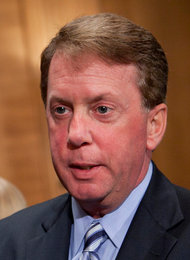We were each going to use HBO Go, the network’s video Web site, to stream the show online — but not our own accounts. To gain access, one friend planned to use the login of the father of a childhood friend. Another would use his mother’s account. I had the information of a guy in New Jersey that I had once met in a Mexican restaurant.
Our behavior — sharing password information to HBO Go, Netflix, Hulu and other streaming sites and services — appears increasingly prevalent among Web-savvy people who don’t own televisions or subscribe to cable.
It’s hard to know exactly how common it is: traditional analytics firms like Nielsen and comScore can’t track it, and cultural research organizations like Pew haven’t done extensive surveying about it. An informal BuzzFeed survey, which was a partial inspiration for this column, found that several dozen people in its office used someone else’s account information for HBO Go. And based on countless anecdotes, conversations, tweets and text messages, such behavior seems to be on the rise.
“It also seems like a pretty serious problem,” wrote John Herrman, a senior editor at BuzzFeed and author of the polling report. “While our office is fairly young and not representative of HBO’s broader customer base, it is representative of a rising generation of people who 1) like watching HBO shows and 2) cannot fathom paying for them.”
Do the companies, particularly HBO, view this as especially problematic? I hesitated before asking, worried that any inquiries would prompt a crackdown, with the result that I’d become the most-hated person on the Internet.
But to the collective relief of nearly everyone I know, the companies with whom I spoke seemed to have little to no interest in curbing our sharing behavior — in part because they can’t. They have little ability to track and curtail their customers who are sharing account information, according to Jeff Cusson, senior vice president for corporate affairs at HBO. And, he said, the network doesn’t view the sharing “as a pervasive problem at this time.”
According to HBO, 6.5 million of its 30 million subscribers have signed up for HBO Go. When I asked Mr. Cusson if the network would consider figuring out a way to capture and monetize those slippery users who were piggybacking on others’ accounts, he declined to speculate on what might be possible.
“The best business approach at the time is in the business model that we currently have,” he said.
In other words, it isn’t financially viable for HBO to offer a cheaper, digital-only subscription, either sold separately or bundled to an Internet service. So, to a point, account sharing is allowed.
OTHER subscription streaming services have a different approach. Spotify, the music streaming service, does not allow two people to play songs simultaneously using the same account. A representative at Hulu says that the company’s paid subscription service, Hulu Plus, is designed for a single user and that the company doesn’t let people stream the same show to different screens at the same time. (Amazon and Netflix did not respond to requests for interviews, but both companies have similar mechanisms in place for their services, though different users on the same account can watch different programs at the same time.)
On Amazon Prime, for example, if two people try to watch the same episode of “Pretty Little Liars” using the same account, both streams will be frozen and a warning message will flash. But one user can simply watch something else until the first person is done trying to figure out who “A” is.
This feels like a missed opportunity for all these services. It’s the failure to grasp the future of television as a shared social experience online. Sure, we are all scattered around, watching all sorts of programs. But then there are moments, as in the days of old, when we are all huddled together — figuratively speaking — tuning into the same show or event at about the same time each night. These days, though, we are watching through some kind of connected device, whether it’s a smartphone, a laptop or a Web-connected television.
Nor does social viewing have to be around a big event. For example, I watched “Friday Night Lights” all winter on Netflix, along with someone I don’t know who also shares the account. Every time I log in, I can see the last episode that this mystery viewer watched — and yet there’s currently no way for us to chat about our reactions to it. That would be much more fun than bugging my other friends about plot twists and turns they saw ages ago, when the show was first broadcast.
Article source: http://www.nytimes.com/2013/04/07/business/streaming-sites-and-the-rise-of-shared-accounts.html?partner=rss&emc=rss
